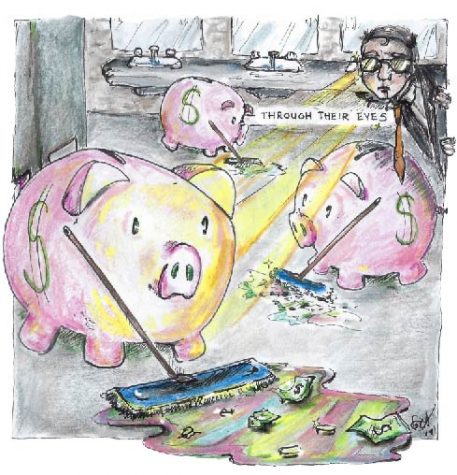Making messes
Privatizing janitorial services costs more than it saves

Efficiency. When kids who lived less than two miles from their schools weren’t allowed on school buses anymore, it was for efficiency. We changed our school schedules – sacrificing instruction time each day and shortening our periods – for efficiency. If a recent proposal by the school board goes through, we’re about to become even more efficient – and it could be messy.
The idea: outsource janitorial services throughout the county to private companies, effectively firing all our current janitors and switching to a third-party provider. For janitors a couple years away from retirement, there are concerns that this will threaten their benefits. Having to find a new job so close to retiring age opens up new challenges, not only in the search for employment, but also potential age discrimination by employers.
The school board has yet to make a decision. According to their research in counties with similar policies, private companies hired for these services were 80% composed of former district employees, but that hasn’t stopped protestors from gathering downtown at the district headquarters. In their hands, they carry signs that read, “Save Our Custodians.”
We have endured budget cuts like these thus far because we wish to see the benefits of such measures. Schools need air conditioning. Our own gym is still plugged full of yellow tubes, wheezing with cool air from a contraption so elaborate that it was photographed by the Tampa Bay Times last August. Others are not so lucky.
In fact, projects are already being planned and some are underway to correct situations like this: 21 schools will get new A/C units this summer, 13 will receive new roofs, 31 schools will get new carpets or paint jobs, and 50 new playgrounds, tracks and athletic courts are to be installed, as reported by ABC Action News.
But, if we’re at the point where we are considering outsourcing janitorial work to save money, how can we afford this?
According to the same source, the district was reported to have received their first $9 million check from the new “Half Penny Tax” April 2. This is only the first payment – coming from just one month of the sales tax – and is anticipated to total to $130 million each year for the next 10 years. Relative to this new revenue stream, it calls into question how significant these custodial savings could be in comparison.
Privatizing janitors, then, feels like a desperate measure that has been proposed before truly becoming necessary. Custodian employment has already been cut, with 116 positions removed in May 2018, resulting in an estimated $2 million savings reported by the Tampa Bay Times. Those against this proposal further argue that a private company could never offer the same quality of service that regular employees do, nor could they have the same personal relationship with the school and the kids that they serve.
Custodians do not have easy jobs. They are the caretakers of our schools, ensuring that our children have a safe and clean environment for their development. If they are hired by a private company for the same work, where do the “savings” come from? Their salary? What human standard of living are we supporting if we take this route?
Perhaps when we look for ways to stream-line our finances, we should consider not only the numerical cost, but the human cost. When we start guiding our institutions solely by price-analysis, we threaten to lose sight of the people that make education possible. Let’s not set a precedent of cutting corners.
It’s time that we took care of the people who take care of us.
